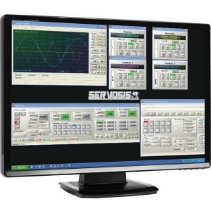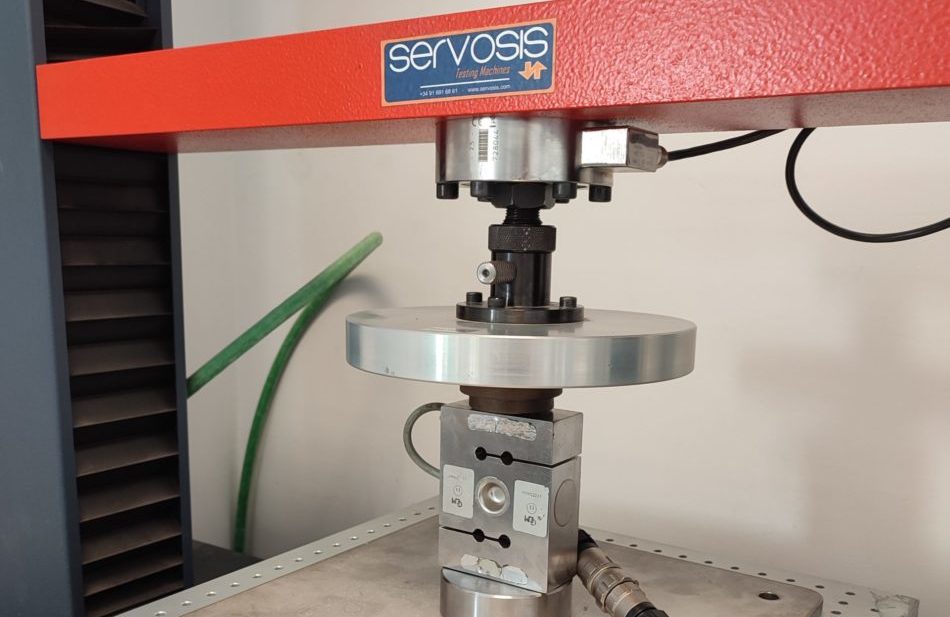- 28 de February de 2023
- by Adriana Rodriguez
- News, News
The compression test is another test that will help us to perform a successful quality control of the material in question, determining its resistance to compressive stress or load.
This practice is commonly used in concrete or cement, rubbers, rocks, wood, plastics, composites and even to assess the endurance of finished parts.
They evaluate the safety, durability and integrity of materials and components.
How are compression tests performed?
To carry out the test, a specimen of the material to be tested is introduced into a specific test rig. The test is carried out in such a way that the procedure specification is met and the necessary data is collected on the gauges of the press.
The test data provide results in the form of a stress-strain diagram which, among other things, show the following;
- The yield limit, the point at which the material enters a state of creep, unrecoverable deformation of the specimen.
- The single strength limit or breaking limit, which represents the maximum stress reached by a material before breaking.
- The breaking point, which indicates the exact stress at which the material breaks.
At Servosis we have the necessary machinery to carry out this type of material testing. Among our catalog for compression testing machines we find the MES SERIES.
Compression testing machines
MES SERIES
The MES Series is used for testing specimens of concrete, rocks, cements and construction materials between 150 and 800t. This type of machines are built according to ENE -EN 12390-4 with accuracy class 1 according to UNE-7500-1.
These machines can be equipped with single or double acting actuator.
In the first case, it is controlled by a proportional valve, sufficient for simple compression tests mainly.
In the second case, it is controlled by a servo valve and incorporates a displacement reader and a load cell. This system provides high precision control to the machine.
It is also possible to close the control loop by force or by position, in this way the MES Series machines equipped with double-acting cylinder are an improvement alternative to the traditional compression testing presses.
All MES Series machines are prepared for the connection of an additional testing frame, usually for bending tests on prismatic specimens. Both the hydraulics and the control system are prepared as standard for the incorporation of this second test frame.
A specific application for the MES Series is rock testing, for which several accessories are required:
–Hoek cell: for triaxial testing according to UNE 22- 950-92.
–Measurement module with strain gages: direct module for direct measurement with strain gages for Poisson coefficient calculation glued on the specimen. Standard with 4 channels expandable to 8.
–Measurement module with deflectometer: for axial strain measurement and modulus calculation.

ANALOG MEASUREMENT MODULES
Measurement with strain gages
Strain gages directly glued on the specimen are used to measure the axial and diametrical deformations that occur in the specimen during the triaxial test.
Usually the test is performed using 4 bands, 2 of them for axial strain measurement and 2 for diametral strain.
The compression testing presses of the MES Series can incorporate measuring systems with bands to carry out these tests, from the measurement obtained the Poisson’s coefficient is obtained.
This equipment is equipped with a wheatstone bridge signal conditioner. The measurement of the different bands is connected to a previous step that completes the wheatstone bridge and its measurement to the conditioner.
ANALOG MEASUREMENT MODULES
Measurement with deflectometers
When the test does not require the use of strain gages, an option to have a direct measurement of the deformations produced in the specimen is the use of deflectometers.
Mounted on specific supports or in contact with the compression plates of the press, these devices provide a direct strain measurement for the calculation of modulus, axial strain, etc…
The MES Series of Servosis testing machines can incorporate analog measurement modules for use with deflectometers or any other type of extensometry element.
MES Series. Control Software
The compression testing machine is controlled by our PCD2K software, which provides the user with various options for its use:
The options for general use, with which you have the maximum possibilities of performance in the realization of tests. The customer can configure his test in a personalized way and process the data afterwards.
The test windows under customized standard, with which the maximum simplification in the performance of a specific test is available, as only the elements necessary for the performance of this specific test are agglutinated in a single window, and the results of all the calculations indicated in the standard are obtained directly. These windows are always designed according to the needs of the test and the customer’s request.
As many test standards as desired can be loaded on the same machine, with no other limitation than the maximum load capacity imposed by the machine and the maximum speed, determined by the hydraulic unit.
The test report will show the Standard under which the test has been performed, the parameterization of the test, the machine data and the test results, as well as the Force/Strain graphic curve.
At Servosis, we have all the necessary equipment to perform both compression tests and other types of tests.

If you want more information about our compression tests, please contact us!







